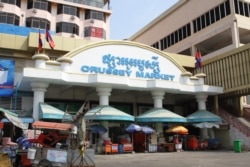Market vendors and farmers expressed concern over the closure of dozens of markets in Phnom Penh, many of which are COVID-19 hotspots. This has affected their incomes and could lead to reduced food supplies in the capital.
As of Friday, all the markets in Phnom Penh and one in neighboring Takhmau city have been closed by authorities for having a high incidence rate of COVID-19.
Food and produce vendors have been forced to sell on sidewalks and have had their vegetables confiscated by authorities cracking down on “illegal” sales of goods in the city.
Doeum Kor market, a critical wholesale market for the capital, has reported at least 253 COVID-19 cases and has been closed indefinitely since the end of Khmer New Year last week.
Sy Rasy, a wholesale vegetable vendor, said the closure of Doeum Kor market was hurting both wholesale vendors and the consumers. The 22-year-old vendor and her husband both tested negative for COVID-19 but are in quarantine until the end of April.
“There could be a shortage in food supplies. As an example, we have been eating our last stocks of unsold vegetables and have no meat left,” Sy Rasy said.
“You can order online and store foods if you are resourceful and have some savings, but for daily wage earners like ourselves we cannot do that,” she added.
A government Telegram group to address issues faced by the lockdown has been flooded with thousands of messages from residents for food and money, many saying they were down to their last few days of food.
Rasy recommended that market vendors who were negative for COVID-19 should be allowed to sell their goods while adhering to social distancing norms and other COVID-19 guidelines.
“This is a good option because we are staying at home without income and running out of money now,” she said.
Yang Saing Koma, an agriculture expert and an opposition politician, said the authorities should come up with quick alternatives to supplement food shortages following the closure of markets.
“We need to rethink the approach of closing [markets] by providing alternatives to allow [people who are] low-risk or those who were tested negative to resume their business and do regular mass testing at the market,” Yang Saing Koma said.
Li Ailan, World Health Organization’s representative in Cambodia, said the government “must balance” health measures with the economic and social impacts.
“There are steps that can be taken to mitigate the risk of infection in markets, such as temperature screening for workers and customers, ensuring physical distancing, providing adequate handwashing facilities, and limiting the number of people allowed to enter the market at any one time,” Li Ailan said in an email.
Phnom Penh municipal spokespersons could not be reached for comment on Friday.
Phnom Penh Governor Khuong Sreng told Radio France Internationale on Thursday that the state was going to use buses to transport produce and meat to residents in 54 locations across the capital.
“It must be uncomfortable for everyone,” Sreng said. “It must be more difficult than the pre-lockdown time but it is worth being difficult in a short time to prevent a long-time disaster.”
Khuong Sreng said the municipal government had not banned home delivery and food transport in the capital. But, others like vegetable supplier Nhem Sovannary disagreed with the governor.
Nhem Sovannary, a farmer and vegetable wholesaler in Takeo’s Tram Kak district, said there were multiple checkpoints between the province and Phnom Penh, making it hard for truck drivers to get through.
“We can only supply in small amounts due to complications in transportation which have seen a reduction in the number of drivers, who have to beg for a pass at multiple checkpoints till they reach Phnom Penh,” she said.
Kim Ngech, a vegetable farmer in Kandal’s Saang district, said wholesale agents were not buying vegetables from farmers in her villages because they were unable to transport the produce to Phnom Penh.
“Some villagers are throwing away their lettuce and spinach because they are going to decay,” said Kim Ngech.
“I am now worried that my vegetables will be rotten as well,” she said.





